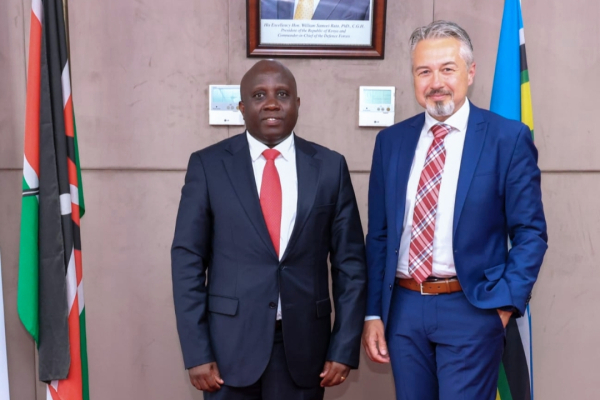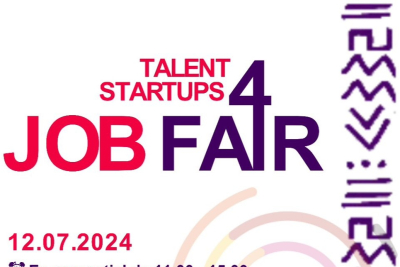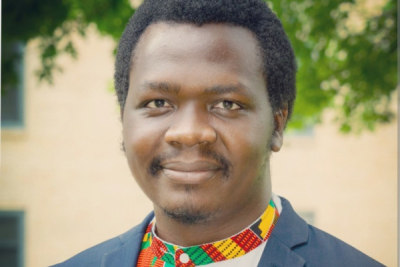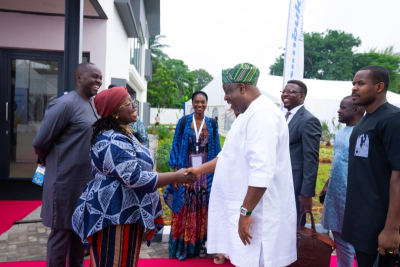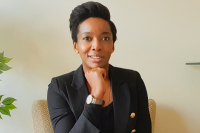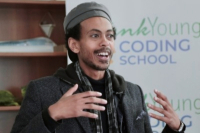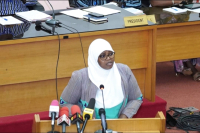Kenya, in its pursuit of technological partners to aid its digital transformation, is turning to international collaborations and strategic investments to achieve its goals. Germany stands out as a potential key partner in this endeavor.
German company Lufthansa Industry Solutions, specializing in IT consulting and systems integration, has recently announced its intention to invest in Kenya. On July 9, a delegation led by CEO Jörn Messner (photo, right) and Chief Commercial Officer Joern-Matthias Derrer met with John Kipchumba Tanui (photo, left), Principal Secretary for Information Technology, Communications, and Digital Economy of Kenya, to discuss potential collaborations.
"They are exploring Digital investment opportunities in Kenya, seeking potential partnerships and planning to establish their center in the country, joining major players like AWS and Microsoft. Kenya is actively encouraging such investments to boost economic growth and innovation," John Kipchumba Tanui announced on X.
Lufthansa Industry Solutions, a subsidiary of the German national airline Lufthansa, assists clients in their digital transformation. Their expertise includes implementing integrated flight folders (iFF) for pilots, digitizing documentation processes for airlines, providing private 5G networks for businesses, and more.
The proposed partnership with Kenya could strengthen local technological infrastructure and enhance the country’s digital capabilities. This initiative is part of a broader strategy to position Kenya as a regional tech hub, supporting its vision to become a digital innovation center in East Africa.
Samira Njoya
A digital entrepreneur and investor with over 22 years of experience, he assists companies in executing technological projects and supports startups in their development.
Zulfiq Isaacs (photo) is a South African serial tech entrepreneur and the founder and CEO of Liquid Thought, a digital innovation agency. He provides technological solutions to businesses and organizations to help them thrive in the digital economy.
Founded in 2001, Liquid Thought stands out for its custom solutions designed to promote the growth and competitiveness of its clients. The company focuses on customer experience, digital innovation, and transformation services, working with brands such as AlphaCode, Paramount, and Sanlam.
Liquid Labs, the company’s collaborative innovation arm, supports groundbreaking ideas. It offers ideation, research, and prototyping services for brands, businesses, and entrepreneurs with innovative concepts requiring technological support.
Zulfiq Isaacs is also an angel investor and advisor to startups across various sectors, including fintech and healthtech. In 2009, he co-founded Moneysmart, a free online personal finance management platform that helps users take control of their finances with a secure, user-friendly system for tracking budgets and expenses in one centralized location. He holds a degree in information systems, statistics, finance, and strategy from the University of Cape Town, earned in 2000. After graduating, he worked as a business analyst at Dimension Data, a technology company operating in the Middle East and Africa that provides innovative solutions.
Melchior Koba
Digital Africa is set to host the Talent4Startup Job Fair on July 12. The fair seeks to bridge the gap between talented professionals and emerging startups, thereby boosting employability in the tech sector.
The job fair will feature candidates skilled in Front-End Web Development, Back-End Web Development, Digital Marketing, and Data Analytics.
Douala's city services are going digital, and now it's the moto-taxi industry's turn. This push to modernize the transportation system aims to improve safety, streamline operations, and make things easier for both drivers and passengers.
In a press release issued on Wednesday, July 3rd, the Douala City Council announced a digital registration program for the city's moto-taxi drivers. This initiative aims to combat insecurity and help residents distinguish legitimate moto-taxis from potential criminals.
"We've collaborated with the administration to ensure a smooth digital registration process for our members," said Simplice Tabate, head of moto-taxis in Douala's Fourth District. "Following this launch, we'll replicate this approach in the Fourth District and other areas."
This program aligns with Cameroon's Digital Plan 2020-2025, which promotes digital technology as a driver of economic and social development. Douala has actively embraced this strategy, having digitized its parking system in November 2021. Earlier this year, the city launched a digital platform to attract investment from Cameroonian expatriates into the economic capital.
Starting July 11, moto-taxi drivers can register by presenting their national ID card, a valid category A driver's license, and their vehicle registration card. Inspections to verify registrations will commence on September 15.
The digital registration program aims to enhance safety and order within Douala. The platform will create a verified database of drivers, ensuring only authorized individuals operate moto-taxis in the city. This initiative reflects Douala's commitment to utilizing digital technology for improved public services and urban management.
Adoni Conrad Quenum
A computer engineer, he is dedicated to democratizing e-commerce, enabling merchants to create online stores and easily sell their products.
Andréas Koumato (photo), a Chadian computer scientist and tech entrepreneur, is the founder and CEO of Mossosouk.com, a tech company specializing in e-commerce. Founded in 2014, Mossosouk.com aims to simplify commerce in Chad by offering a web platform and mobile app that allow users to purchase products online from partner merchants.
The site features a wide range of products, including electronics, beauty products, fashion items, food, and books. For merchants, Mossosouk.com provides the opportunity to open a virtual store on its platform, offering product promotions and posting classified ads. The platform also includes a tracking option that enables users to follow their orders from purchase validation to delivery.
In addition to his role at Mossosouk.com, Andréas Koumato serves as a special advisor to the Prime Minister of Chad. Along with other Chadians, he co-founded Generation ABCD (AnyBody Can Dream) in 2015, an organization that promotes the right to dream, ethical and helpful leadership, entrepreneurship, and sustainable development goals. He served as the innovation and entrepreneurship lead for two years and is now the organization's president.
In 2021, he co-founded EnerGo, a startup specializing in solar energy aimed at ending energy poverty in Africa. The startup is developing an integrated off-grid solar power plant to electrify households and small businesses in Chad.
Andréas Koumato holds a master's degree in mathematics and computer science applied to finance and insurance, obtained in 2014 from Polytech Nice Sophia, France. He also graduated from Colorado State University College of Business in 2021 with a master’s degree in business administration.
Melchior Koba
Supporting and establishing youth-led tech startups can boost economic activities in finance, agriculture, and healthcare, contributing to overall growth on the continent. Such moves create jobs, address unemployment among Africa's youth, and provide livelihoods.
The UNDP and the Timbuktoo Africa Innovation Foundation launched the first Fintech Timbuktoo Hub in Lagos, Nigeria on July 9. This facility aims to drive innovation and growth within Africa's fintech ecosystem.
The moment is here!
— UNDP Nigeria (@UNDPNigeria) July 9, 2024
We are live at the launch of the premier #timbuktoo Fintech Hub.
Today, we are revolutionizing the future of fintech in Africa.
Join us: https://t.co/olFgxgSmlV pic.twitter.com/9i0oLVlBh8
Speaking during the launch, Ms Ahunna Eziakonwa, the UN Assistant Secretary-General and UNDP Regional Director for Africa,said: “Africa is the place where ideas comes from to unite the world. Our innovators are finding solutions to the most pressing global problems. timbuktoo is about changing the way development works and investing in young talents. I invite you all to join and begin to see Africa from the lens of opportunity."
Timbuktoo is a partnership between the UNDP, African governments, and the private sector, positioned as the world's largest initiative supporting Africa's innovation ecosystem and reshaping financial technology and development across the continent. Launched in January 2024 at the World Economic Forum in Davos and headquartered in Kigali, Rwanda, the initiative leverages collective power to create scalable and impactful conditions across Africa. Timbuktoo aims to mobilize and invest US$1 billion in capital to transform 100 million livelihoods and create 10 million dignified new jobs across African countries.
This hub, located at UNDP's Innovation Center in Lagos, isthe first of eight tech hubs, with additional hubs planned for 2024 in Kigali, Rwanda (Healthtech), Accra, Ghana (Agritech), and Lusaka, Zambia (Minetech). Forty-two young startups from 31 African countries have been selected for the first cohort.
The launch is pivotal to innovation and financial inclusion across Africa. It will serve fintech entrepreneurs, investors, and experts, offering collaborative workspaces, mentorship programs, and advanced technology to support startups across Africa in building impactful solutions.
Africa, with 60% of its population under 25, presents a fertile ground for innovation despite a low unique mobile subscriber penetration rate of 43% in 2022, according to the 2023 ‘Mobile Economy Sub-Saharan Africa’ report by GSMA. GSMA projects that by 2025, 634 million Sub-Saharan Africans (52%) will subscribe to mobile services, driving digital transformation.By nurturing local talent and fostering cross-border collaborations, the Timbuktoo Fintech Hub will play a pivotal role in shaping Africa's financial technology future, reflecting the UNDP's commitment to sustainable development through technology.
Hikmatu Bilali
The Agribusiness Innovation Challenge, co-created by the Nigeria Climate Innovation Center (NCIC) and the Global Alliance for Improved Nutrition (GAIN), invites young entrepreneurs aged 18-35 passionate about agriculture and technology to develop solutions to improve the food supply chain in Nigeria.
Winners will secure a 2,000,000 naira ($12,700) equity-free grant and other benefits, with applications closing on July 26th, 2024.
After several years in Belgium, she returned to the Democratic Republic of Congo to support her community. She is now leading an innovation center, where she has launched numerous programs and initiatives aimed at supporting and mentoring Congolese entrepreneurs and innovators.
Sidonie Latere (photo), a Congolese entrepreneur, is renowned for her commitment to supporting entrepreneurship in the Democratic Republic of Congo (DRC). As the founder and CEO of Kobo Hub, an innovation center established in 2018, she develops various programs to assist entrepreneurs and businesses.
Kobo Hub provides invaluable support to project creators and promoters by offering a network of experts and access to the skills, resources, and infrastructure necessary for the success and growth of their startups. The center offers a modern coworking space and tailored training, mentoring, incubation, and acceleration programs to meet the specific needs of each project.
"Kobo Hub offers completely different services from incubators, particularly in that we support existing projects, while an incubator helps develop ideas into projects. The goal is to bring this business project to its full potential. We offer a six-month support program that includes coaching, training, and mentoring. The program is customized as it follows a project diagnosis," explained Sidonie Latere in 2022.
In addition to her role at Kobo Hub, Sidonie Latere serves as the Director of Partnerships for Women in Tech in the DRC. She graduated from the École supérieure des arts Saint-Luc in Belgium with a bachelor's degree in visual arts and advertising in 2011.
Prior to founding Kobo Hub, Latere had an extensive career in the Congolese business and entrepreneurial ecosystem. In 2013, she became the Artistic and Creative Director of Exp Agency, a marketing agency in the DRC. The following year, she was appointed Creative Director of Welike Agency, an advertising and communication agency, and Vice-President of the Francofolies de Kinshasa music festival. In 2017, she joined Osmose Digital, a Congolese startup specializing in the design, production, and distribution of educational and informative digital content, as CEO. From 2020 to 2022, she worked as the General Manager of Yayo Africa, a web platform enabling users to send credit to their relatives in the DRC.
Melchior Koba
Passionate about building Ethiopia's next generation of tech leaders, he uses fun and engaging methods to gradually introduce children to the world of computer coding.
Nathan Damtew (photo), a computer science graduate from Addis Ababa University, is an Ethiopian entrepreneur dedicated to teaching coding to children through his startup, BeBlocky, and learning center, Yenetta Code.
In 2018, Damtew founded BeBlocky, a gamified learning app that introduces young African children to the fundamentals of programming using a block-based visual programming language. The app guides characters through puzzles, helping children master coding concepts in a fun and intuitive way. BeBlocky's user-friendly interface allows children to advance without prior coding knowledge, and parents can track their children's progress through a dashboard.
Alongside BeBlocky, Damtew co-founded Social.ly in 2017, a digital marketing company that specializes in lead generation through social media, website development, content creation, marketing, and SEO. Social.ly helps organizations reach their full potential by combining innovative ideas with technology.
In 2019, Damtew established Yenetta Code, a learning center in Addis Ababa, Ethiopia, aimed at enabling youth to thrive as builders and creators in the tech field. The center offers various programs to develop market-relevant skills, providing learners with the confidence and capabilities to embrace new careers in coding and technology.
Through his diverse initiatives, Damtew opens doors for young generations, offering them the tools and opportunities to excel in the rapidly evolving tech industry.
Melchior Koba
The Burkina Faso government is stepping up its efforts to improve cybersecurity. They're launching several initiatives to make their digital infrastructure more resilient and protect sensitive data from cyberattacks.
urkina Faso's Transitional Legislative Assembly (ALT) unanimously adopted the Information Systems Security Act on Tuesday, July 9. This new law establishes a legal framework to protect information systems, aiming to reduce vulnerabilities for public administrations and economic development units.
According to the Minister of Digital Transition, Posts, and Electronic Communications, Aminata Zerbo/Sabane (photo), the law is particularly important in the ongoing digitization process in the country. “We are firmly committed to dematerializing administrative acts and procedures to modernize, enhance productivity, transparency, and accessibility for all users. Further initiatives are underway to make digital technology a lever for our socio-economic development,” she stated.
This move reflects the government's focus on strengthening national cybersecurity amidst rapid digital transformation. The country is experiencing a surge in electronic communication services and cyberattacks, further amplified by the ongoing security crisis.
The law strengthens the National Agency for Information Systems Security (ANSSI), established in 2013 to address cyber vulnerabilities. It will not only support ANSSI's operations but also ensure its effective collaboration with other technical actors within the digital ecosystem.
The adoption of this Act marks a significant step for Burkina Faso in securing its digital infrastructure. By enhancing the country's cyber resilience, the law aims to build a safe and reliable digital environment for both citizens and economic actors.
Samira Njoya
More...
The development of an indigenous blockchain is crucial for Africa. By controlling its blockchain infrastructure, African countries can ensure data security and reduce dependency on foreign technology to promote technological advancement.
The National Information Technology Development Agency (NITDA) is considering developing an indigenous blockchain named Nigerium to protect national data and enhance security. NITDA’s Director General, Kashifu Abdullahi, announced this during a meeting with delegates from the University of Hertfordshire Law School.
During the meeting, the university delegation, led by Chanu Kuppuswamy, emphasized the importance of Nigeria controlling its blockchain to avoid foreign influence. “We want NITDA to consider developing an indigenous blockchain on which we can now think of putting all the public service and the land registries of the 36 states and Abuja,” Kuppuswamy said.
The delegation also suggested the creation of a "data embassy" to ensure digital continuity and protect data. This server, hosted in a third-party country but regulated by Nigerian law, would safeguard the nation's data. Additionally, the need for collaboration between government departments was highlighted to harmonize blockchain services.
A 2021 report by Enhancing Financial Innovation & Access (EFInA), a Nigerian Financial Sector Deepening (FSD) organization, reveals that Blockchain has the potential to increase Nigeria’s GDP by $29 billion by 2030, highlighting the significant economic impact of the adoption of a secure blockchain in the country.
This initiative falls in line with the country’s adoption of a national blockchain policy in 2023 and follows NITDA's plans to establish blockchain research centers across Nigeria, underscoring the country's commitment to leveraging blockchain technology for national development.
Hikmatu Bilali
The mobility market is experiencing rapid growth across the continent. In South Africa, where many industry giants are active, a local startup is attempting to establish its own unique position. The company's name, which translates to "hurry" in Zulu, reflects its dynamic approach to the market.
Shesha is an e-mobility solution developed by a South African startup. It allows users to book taxis online through a mobile app. Launched in 2024, the startup is based in the Gauteng province and is supported by various entities such as the Gauteng Taxi Industry Trust, Santaco Gauteng, and the Gauteng National Taxi Alliance.
The app is currently available only on Android, where it has already been downloaded over 10,000 times according to Play Store data. After downloading, users create an account with their ID number. Once verified, they can access the startup's services. Drivers are required to provide more documentation, including an ID, driver's license, and vehicle inspection report.
These measures are taken to ensure the safety of both drivers and customers. "Shesha verifies the identities of everyone on a Shesha trip from the customer to the driver, ensuring that they are indeed who they say they are," said Nomsa Mdhluli, spokesperson for the startup.
To book a driver, users need to enter their route into the app, choose the type of vehicle, and confirm the reservation. Notably, it is impossible to make a reservation without sufficient funds in the user's electronic wallet. The startup mandates payments through this secure and transparent channel. The wallet can be topped up via bank cards or at an ATM.
"...Another factor when we consulted with e-hailing operators was the fact that cash is allowed also puts them at risk. So, we use a cashless system," Nomsa Mdhluli said in an interview with a local South African news.
Shesha, which already has about 13,000 drivers on its platform, currently operates only in the Gauteng province. The startup plans to expand to other provinces in the coming months.
Adoni Conrad Quenum
Africhange, a leading global remittance provider, launched, on July 3, its operations in the United Kingdom.
The platform aims to provide affordable and dependable international money transfer solutions for Africans abroad.
By addressing crucial infrastructure gaps, rural communities gain access to global economic connectivity, digital services, and opportunities in digital education and e-commerce. These advancements establish the groundwork for sustainable socio-economic development in Africa, positioning these communities on the global stage.
Zambia inaugurated its first smart village project in Namwala, Southern District on July 5. Sponsored by Huawei Technologies, a leading Chinese firm, the initiative includes a communication tower and a solar power system designed to power numerous homes, marking a pioneering step in Zambia's rural development.
"We extend our sincere gratitude to Huawei Technologies Zambia for their support, which aligns with our government's digital agenda to foster rural development," stated Zambian President Hakainde Hichilema during the project's launch.
Deeply honored to have been the guest... - Hakainde Hichilema | Facebook
The launch event included the unveiling of a mini-solar plant equipped with solar panels as part of the Namwala project, underscoring Huawei's commitment to sustainable development. At the ceremony, Huawei Technologies Zambia also signed a memorandum of understanding with the Zambian government to establish 100 smart villages across the country's 10 provinces.
This initiative can accelerate the Zambian government's progress toward achieving the National Electronic Government Plan (NEGP) 2023-2026, which aims to leverage digital technologies for efficient public service delivery, with key focus areas including digital infrastructure and capacity building.
Zambia's progress in digital transformation has led to an improved ranking on the E-Government Development Index (EGDI), moving from 148th to 131st out of 193 countries between 2020 and 2022. It further reinforces Zambia's commitment to enhancing digital infrastructure and bridging the digital divide, contributing to its ongoing progress in e-governance and rural development.
Hikmatu Bilali


